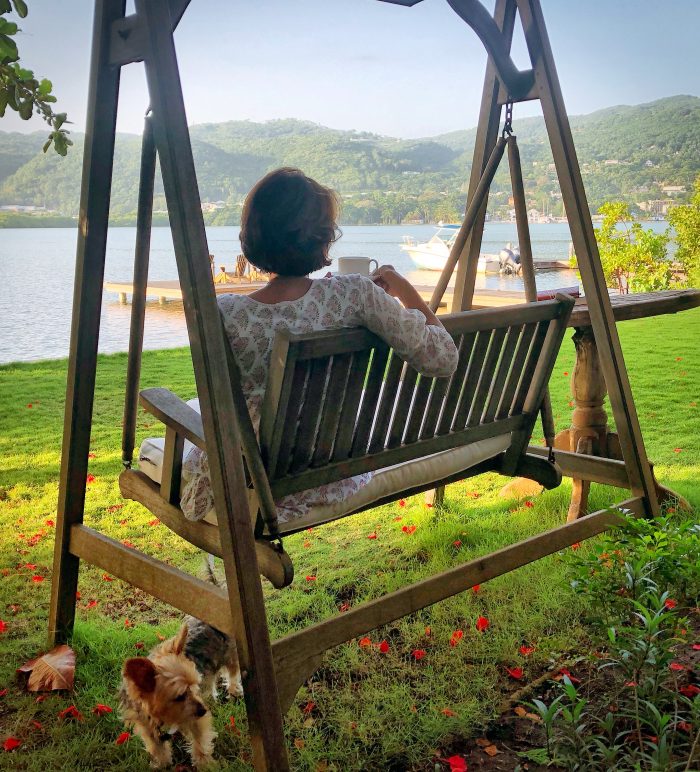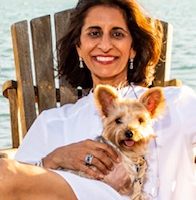My mother’s story ended when she was 69.
However, in my mind, her story still continues.
I think of Ma every day. She always knew what to say, when to say it, and how to say it, without hurting anyone.
When I have to make a crucial decision, I often ask myself: “What would Ma do?” She was the peacemaker and the glue in the family. I could call her about anything. When we hung up, I always felt better.
The greatest thing my mother taught me was to focus on the positive. If a person had ten qualities, of which seven were virtues, and three were vices, she would focus on their goodness—I learned to find the positive in everyone, and pay less attention to the negative.
As a child, I wasn’t close to my mother. She went to work with my father in the family business when I was two years old—she was knowledgeable and brilliant with numbers. She didn’t quite understand me as a teenager; however, our relationship strengthened after I went to college, and even more so after I had gotten married.
I was only 38 when I lost her. I wasn’t ready to let go. There was still so much I wanted to learn and share with her.
My children only had the opportunity of seeing my mother a few weeks every year, as we did not live in the same country.
When we visited in the summer, our favorite time of the day was 4 p.m. when we would sit in the front garden on her double-seated white swing for afternoon tea. Hogan and Hero, her German shepherds with their shiny black coats, would sit by her feet, guarding her faithfully as Argus would Odysseus. Shortbread cookies and cheesy puff pastry snacks from the Dutch bakery were always available in multitudes.
The grandchildren would run around the garden playing, arguing about who would get to drive in the yellow and red Little Tykes car and who would have to sit on its roof. They would take turns on the swing, and we would chat about life until sunset, when my father would come home from work and request that we move inside, as the garden with all its greenery attracted too many mosquitoes. I think he just wanted company in the den to watch TV.
In her mid-60s, Ma went in and out of depression. At 69, she was diagnosed with Non-Hodgkin’s Lymphoma. Her despair, caused by her bouts of depression, deprived her of her will to live.
On the day after Christmas, we flew to my hometown to be with her in her last days. She was at home, and the doctor had removed all tubes that were sustaining her life. He gave her a day or two; however, my father assured us that she would not leave us before the New Year. “She loved to dance on New Year’s Eve,” he said.
She died on January 2, 2003, as if she’d accurately chosen the date with her numerically brilliant mind. She sneaked off in a split second when all her children had left the room—as if she knew that we wouldn’t have been able to handle it.
I cried. I felt as if I had lost a limb. I grabbed her hand tightly and yelled, “No!” That moment is still so vividly imprinted in my mind.
Would this be the abrupt conclusion of a beautiful story? If that was so, what did it all mean?
I decided that somewhere there has to be some continuation of a person’s presence.
In his book, The Personality Puzzle, psychology professor, Dr. David Funder, addresses how a combination of genetics and the environment can influence a person’s personality. There is a personality gene passed on from one generation to the next, which, when combined with life experiences, may explain the similarities of my mother’s nature in her children and grandchildren.
Science explains to us why. However, to see the details, we have to pay close attention.
As the years go by, I’ve begun to notice that there are many things I do that resemble my mother’s actions. Sometimes, when I am explaining something, I include many details, as my husband and children impatiently wait for me to get to the point.
When I observe my mother’s grandchildren, I see traits in each one of them that remind me of her. I see organizational skills in her eldest granddaughter, Gulshan, kindness and positivity in Karoli, and determination for truth and justice in Neelam. Ma’s remarkable brain for numbers was passed on to Kashmira, and Suren has the tact of knowing what to say to every person while being genuine. Praveen loves having long conversations and in-depth discussions like the ones we would have around her table at lunchtime, and Minali is the one who will spontaneously and effortlessly whip up the most incredible meal. The youngest granddaughter, Nazina, reminds us all of a mother’s true love.
We all live our story. By noticing these details, my mother’s story continues.
Part of our story is passed on to our children, and then to the generation that follows. Those who knew our ancestors might recognize some of the similarities in our nature, yet they will go unnoticed unless it is identified and mentioned or written down.
“Write what should not be forgotten.” ~ Isabel Allende
If I don’t write it down, her story will end, and she will be forgotten. So I keep writing, whatever I can recall.
Our parents may think that their story ends, but their message lives on. A part of them continues inside of each one of us and is passed on from generation to generation. When we scrutinize our behavior, we become conscious of the traits and characteristics that we carry forward.
Our parents were not always perfect. Some of the traits passed on could be unfavorable as well. We can use the opportunity of this lifetime to examine the aspects of our behavior that we have adapted from them.
As Socrates said, “The unexamined life is not worth living.” By following this advice, we can modify some of the vices we may have personalized from our parents, and adjust them to what we may perceive as more appropriate to our times. This is how we create our own story.
As I sit in my garden on my swing, sipping my coffee, I reflect on my mother’s story. People often tell me that I look like her. I smile and thank them for this compliment. If I could be even a smidgen of a person that she was, I am blessed.












Read 12 comments and reply